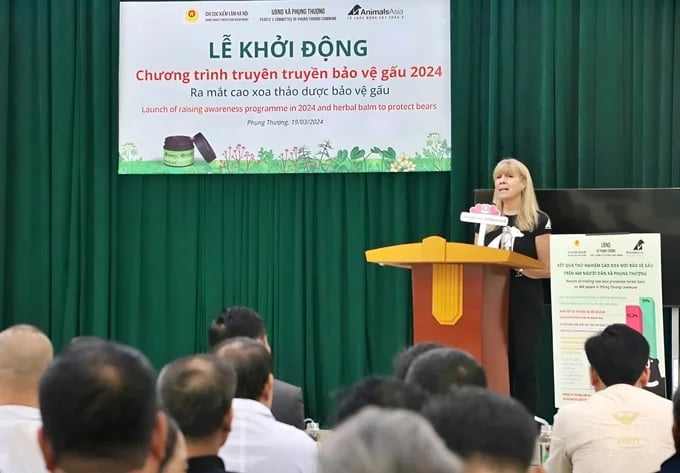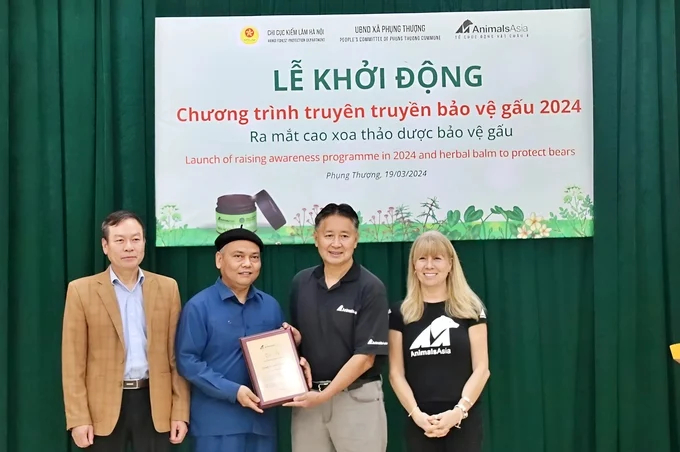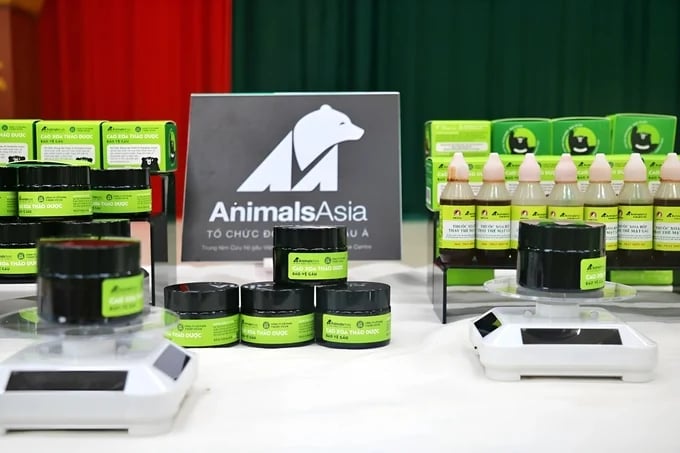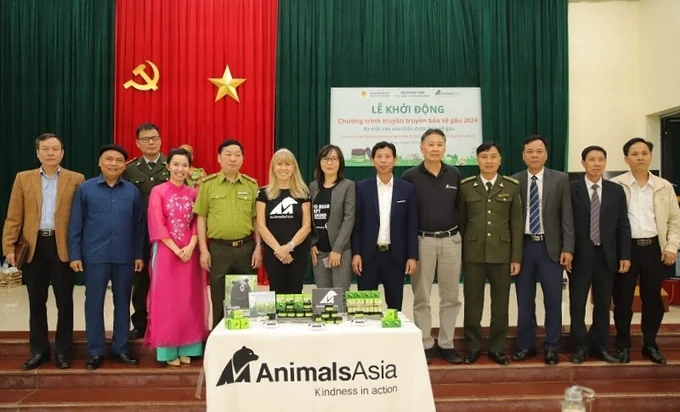November 28, 2025 | 00:55 GMT +7
November 28, 2025 | 00:55 GMT +7
Hotline: 0913.378.918
November 28, 2025 | 00:55 GMT +7
Hotline: 0913.378.918

Dr Jill Robinson, founder and General Director of Animals Asia shared at the launching ceremony of the Bear Protection 2024 program. Photo: PT.
On March 19, Animals Asia coordinated with the Hanoi Forest Protection Department to hold the launching ceremony of the Raising Awareness Programme in 2024 and herbal balm to protect bears in Ha Noi.
The event was held in Phung Thuong commune, Phuc Tho district, Hanoi - the locality with the largest number of captive bears in the country.
The goal of the program is to promote the management of bear farming activities until there are no more captive bears left in the area, raising community awareness in protecting and preserving bears.
Activities are combined with community programs to help improve health, create a civilized living environment, and harmonise with nature.
Mr. Le Minh Tuyen, Director of Hanoi Forest Protection Department, said that in the Raising Awareness Programme in 2024 in Hanoi, Hanoi Forest Protection Department and Animals Asia continue a series of activities and events to propagate bear protection through health consultation sessions and giving away bear bile replacement products to people.
Emulation programs to protect bears will be held at schools in the area and through the construction of herbal gardens to collect medicinal plants, setting up a system of propaganda signs to protect bears.
Educational activities go hand in hand with professional work, inspection and review of bear breeding facilities. At the same time, they go hand in hand with proactively mobilising bear breeding facilities to voluntarily hand over bears to the State, and strive to rally, rescue and care for as many bears as possible.

Representatives of Animals Asia presented certificates to traditional medicine doctors who accompanied the program. Photo: PT.
In addition to law enforcement efforts to protect bears, Animals Asia has actively sought solutions to reduce the demand for bear bile.
Sharing this story, Dr. Jill Robinson, founder and CEO of Animals Asia shared that since the start of bear rescue, the organization has embarked on a long journey to find alternatives to bear bile.
In 2010, Animals Asia contacted the Vietnam Orientally Traditional Medicine Association and began a long-term cooperation process. They published 40,000 books on 32 herbs that can be used to replace bear bile.
In 2016, the herbal balm product was produced from 5 herbs listed in the above-mentioned medicinal plants and herbs book.
This product has been well received with great response by the Phung Thuong community in free monthly health consultations organized by Animals Asia, Hanoi Forest Protection Department and volunteer traditional medicine doctors.
“From those results, we went one step further when cooperating with Vu Gia Company and Cocoon to develop a type of herbal rub that is as effective as rubbing alcohol and more convenient for users.
Today marks the launch of a bear protection herbal balm that replaces bear bile and the start of a propaganda campaign to raise awareness of bear protection", Dr Jill Robinson shares.
An independent survey from clinical trials on 400 people in Phung Thuong commune showed that the herbal balm to protect bears has received great response and support from the community.
Through the survey, nearly 80% of users feel satisfied when using it, more than 92% want to continue using it if given the opportunity, more than 42% of people saw improved mobility after using the paste, more than 41% of people found the paste effective within 1 day after applying, 99% of people find herbal balm easy to use, easy to open and easy to carry out and there are no cases of side effects when applying the balm.

The herbal barm for bear protection products has the same effect as other types of balm made from bear bile. Photo: PT.
After a period of experience using herbal poultices to protect bears, Mr. Can Xuan Phu, Head of Village 3, Phuc Thuong commune admitted, that the balm has the same effect as bear bile in treating bone and joint pain. People are very responsive to the program, attending today's launch ceremony with more than 40 households out of a total of 55 households in the village participating.
In addition, Mr. Phu also said that local forest rangers regularly check and propagate people not to extract bear bile, and advise them to switch to using herbal balms.
Previously, almost every household in the village raised bears. From 2003 - 2004 until now, the number of bear-raising households in the village has decreased sharply to just over 10 households.
Many households in the village voluntarily handed over their bears to the forest rangers. However, there are still households in the village, who, because the amount of money when buying bears and raising them from a young age is too large, would like to receive adequate support from the State.

Traditional medicine doctors are examining and giving health advice to people in Village 3, Phuc Thuong commune. Photo: PT.
As one of the traditional medicine doctors volunteering to accompany the program, Mr. Trinh Kim Lang, Cau Giay Oriental Medicine Association, said, that focusing on educating people about the harmful effects of drinking alcohol and using bear bile products is an important work. Although bear bile extract has certain effects in massage, there are also many other herbs and plants with similar properties.
“When we have proven to people the effects of many types of herbs and plants after being prepared into balms has the same effect as bear bile extract, many people will stop using bear bile extract without much propaganda.
The combination of natural ingredients in herbal extracts helps reduce pain symptoms due to many causes: rheumatism, aching tendons and bones, injuries, falls, sprains", said Dr. Lang.
The Bear Protection balm is expected to be an effective propaganda product, supporting the public awareness campaigns of Animals Asia nationwide, striving for the goal of rescuing all remaining captive bears and ending bear bile farming by 2026.

Delegates took commemorative photos at the ceremony. Photo: PT.
Translated by Hoang Duy
/2025/11/27/3830-1-152901_403.jpg)
(VAN) Dong Nai is developing its key crop areas, expanding planting area codes, and applying high technology to increase the value of agricultural products, aiming at a green and sustainable agriculture.

(VAN) Tay Ninh’s livestock sector is undergoing a major transformation, applying high-tech, closed-loop circular models to build sustainable value chains.
/2025/11/26/3627-4-082628_818.jpg)
(VAN) From a small café on the red basalt highlands, Le Van Hoang started a business with clean coffee, building Enjoi Coffee into a symbol of organic agriculture in the Lam Dong plateau.
/2025/11/25/0045-1-135246_13.jpg)
(VAN) Ca Mau is researching a model of sea-encroaching embankments combined with viaducts and logistics service zones, aiming both to prevent erosion and create land funds for marine economic development.

(VAN) The information was shared at the seminar 'Urban Agriculture - Solutions for Developing Green Spaces,' organized by the Kinh te & Do thi Newspaper and the Biotechnology Center of Ho Chi Minh City.
/2025/11/19/4141-2-132831_216.jpg)
(VAN) One of Japfa's outstanding solutions is implementing digital transformation and artificial intelligence (AI) to optimize operations, enhance productivity, and advance sustainable development.
/2025/11/19/4847-1-093540_448.jpg)
(VAN) The Gia Lai Provincial People’s Committee had a working session with the delegation of the U.S. Department of Agriculture, the State of Idaho, and representatives of the State's leading enterprises.